How well does your company engage its employees?
Take your health check and find out.


Britain is in desperate need of talented staff – yet many from one of the most resourceful and capable groups of people in the country continue to be reluctant to re-enter the workplace after periods of unemployment.
In the UK today, just 60% of black women and 64% of Asian women are currently in work, compared with 74% of white women, according to the latest government figures.
Yet at the same time, around 180,000 new roles were advertised in the first week in January alone, meaning there are now around 1.53 million active job postings being listed, a 24.5% rise on a year ago.
Keeping women from minority ethnic communities happily and gainfully employed can be a complex subject, influenced by a myriad of factors: a lack of flexible working to support care commitments; low levels of confidence; whether English is their first language; or even a lack of up-to-date skills after a career break.
But very often there is one common thread – if they are unhappy in their jobs for whatever reason, they are more likely to walk away than to tell their bosses what they need to be content and to flourish.
I would argue this is much too important a group not to have within the workforce, especially at this time of record vacancies.
I founded my social enterprise in 2009 to address the injustice of unpaid graduate internships. We then widened our scope to include diversity and inclusion services, and it became glaringly obvious there was very little help available to minority ethnic women, who often face various unique barriers to employment.
Five years ago, we introduced a specific programme to improve the employment prospects, update skills and increase the confidence of minority ethnic women through coaching and training.
One of the biggest issues we’ve discovered with these underrepresented groups is they often lacked the confidence to speak up and express their feelings, if things weren’t going well. It was all about communication – or lack of it.
To help with that, we recently set up a partnership with an employee engagement and wellbeing specialist. We are offering Trickle’s feedback app to clients who want to improve their team’s diversity, equity and inclusion. The platform allows workers to voice concerns digitally and anonymously.
Having the option for anonymity is vital, as I know first-hand how nervous some of the women we place with new employers can be, so putting their head above the parapet can feel unbearably daunting. So much so that despite often being amazingly well-qualified and an obvious asset to their employer, many women with doubts, fears or anxieties were more likely to leave than to tell their bosses what they needed to be happier at work.
Minority ethnic women can have multiple challenges to contend with in their lives, such as low socio-economic status, sexism, racism, religious bias, and caring responsibilities. They often need more flexibility from their employer, but can be reluctant to ask for it.
Expanding your methods of employee communication to include written or digital options helps anyone who may prefer not to express their ideas or feelings verbally, giving them the time and space to think about what they want to say, and peace of mind to speak up without fear of repercussions.
In my experience, it’s also about showing a genuine interest in their lives and situations, and asking questions in the right way.
By showing such empathy, any employer can create the culture of trust and support that today’s employees are looking for, no matter their background.